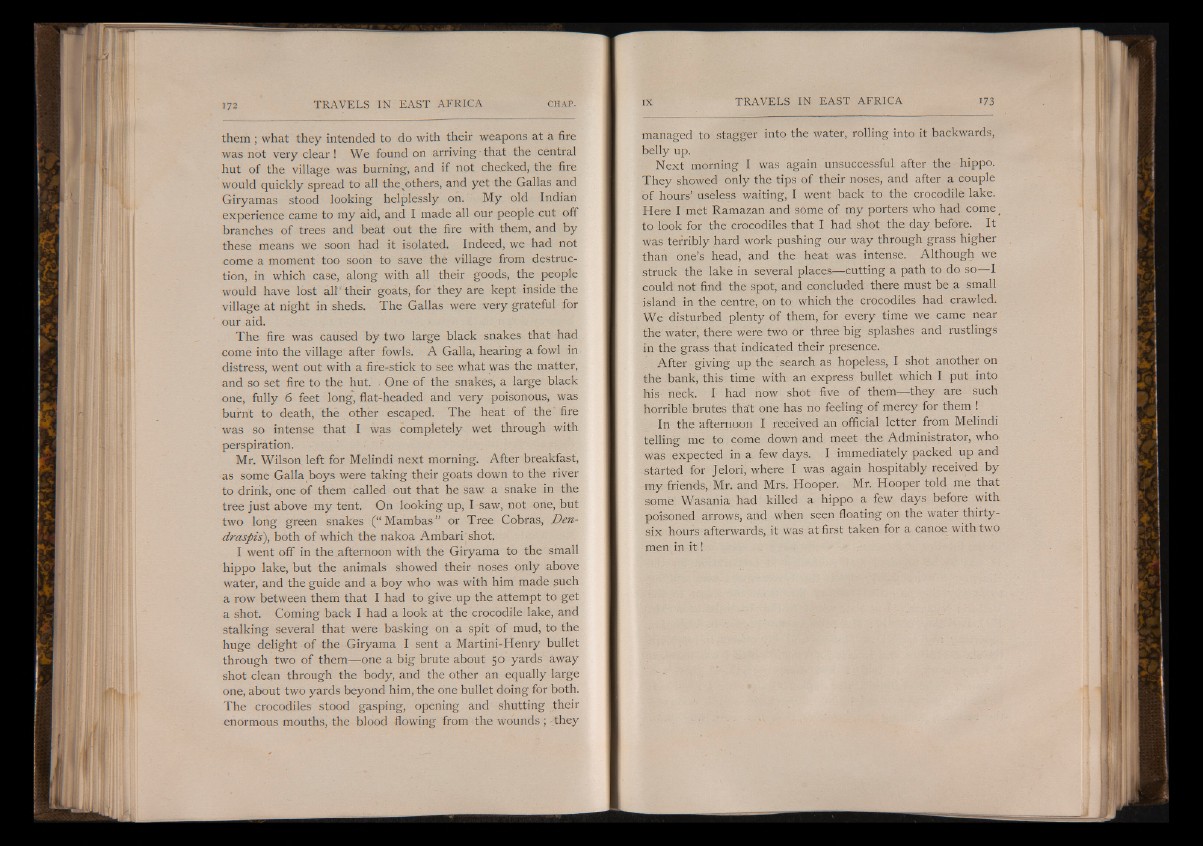
them ; what they intended to do with their weapons at a fire
was not very clear ! We found on arriving that the central
hut of the village was burning, and if not checked, the fire
would quickly spread to all the ^others, and yet the Gallas and
Giryamas stood looking helplessly on. My old Indian
experience came to my aid, and I made all our people cut off
branches of trees and beat out the fire with them, and by
these means we soon had it isolated. Indeed, we had not
come a moment too soon to save the village from destruction,
in which case, along with all their goods, the people
would have lost all their goats, for they are kept inside the
village at night in sheds. The Gallas were very grateful for
our aid.
The fire was caused by two large black snakes that had
come into the village after fowls. A Galla, hearing a fowl in
distress, went out with a fire-stick to see what was the matter,
and so set fire to the hut. One of the snakes, a large black
one, fully 6 feet long, flat-headed and very poisonous, was
burnt to death, the other escaped. The heat of the' fire
was so intense that I was completely wet through with
perspiration.
Mr. Wilson left for Melindi next morning. After breakfast,
as some Galla boys were taking their goats down to the river
to drink, one of them called out that he saw a snake in the
tree just above my tent. On looking up, I saw, not one, but
two long green snakes (“ Mambas” or Tree Cobras, Den-
draspis), both of which the nakoa Ambari shot.
I went off in the jafternoon with the Giryama to the small
hippo lake, but the animals showed their noses only above
water, and the guide and a boy who was with him made such
a row between them that I had to give up the attempt to get
a shot. Coming back I had a look at the crocodile lake, and
stalking several that were basking on a spit of mud, to the
huge delight of the Giryama I sent a Martini-Henry bullet
through two of them— one a big brute about 50 yards away
shot clean through the body, and the other an equally large
one, about two yards beyond him, the one bullet doing for both.
The crocodiles stood gasping, opening and shutting their
enormous mouths, the blood flowing from the wounds ; 'they
managed to stagger into the water, rolling into it backwards,
belly up.
Next morning I was again unsuccessful after the hippo.
They showed only the tips of their noses, and after a couple
of hours’ useless waiting, I went back to the crocodile lake.
Here I met Ramazan and some of my porters who had come |
to look for the crocodiles that I had shot the day before. It
was terribly hard work pushing our way through grass higher
than one’s head, and the heat was intense. Although we
struck the lake in several places— cutting a path to do so— I
could not find the spot, and concluded there must be a small
island in the centre, on to which the crocodiles had crawled.
We disturbed plenty of them, for every time we came near
the water, there were two or three big splashes and rustlings
in the grass that indicated their presence.
After giving up the search as hopeless, I shot another on
the bank, this time with an express bullet which I put into
his neck. I had now shot five of them— they are such
horrible brutes that one has no feeling of mercy for them !
In the afternoon I received an official letter from Melindi
telling me to come down and meet the Administrator, who
was expected in a few days. I immediately packed up and
started for Jelori, where I was again hospitably received by
my friends, Mr. and Mrs. Hooper. Mr. Hooper told me that
some Wasania had killed a hippo a few days before with
poisoned arrows, and when seen floating on the water thirty-
six hours afterwards, it was at first taken for a canoe with two
men in i t !